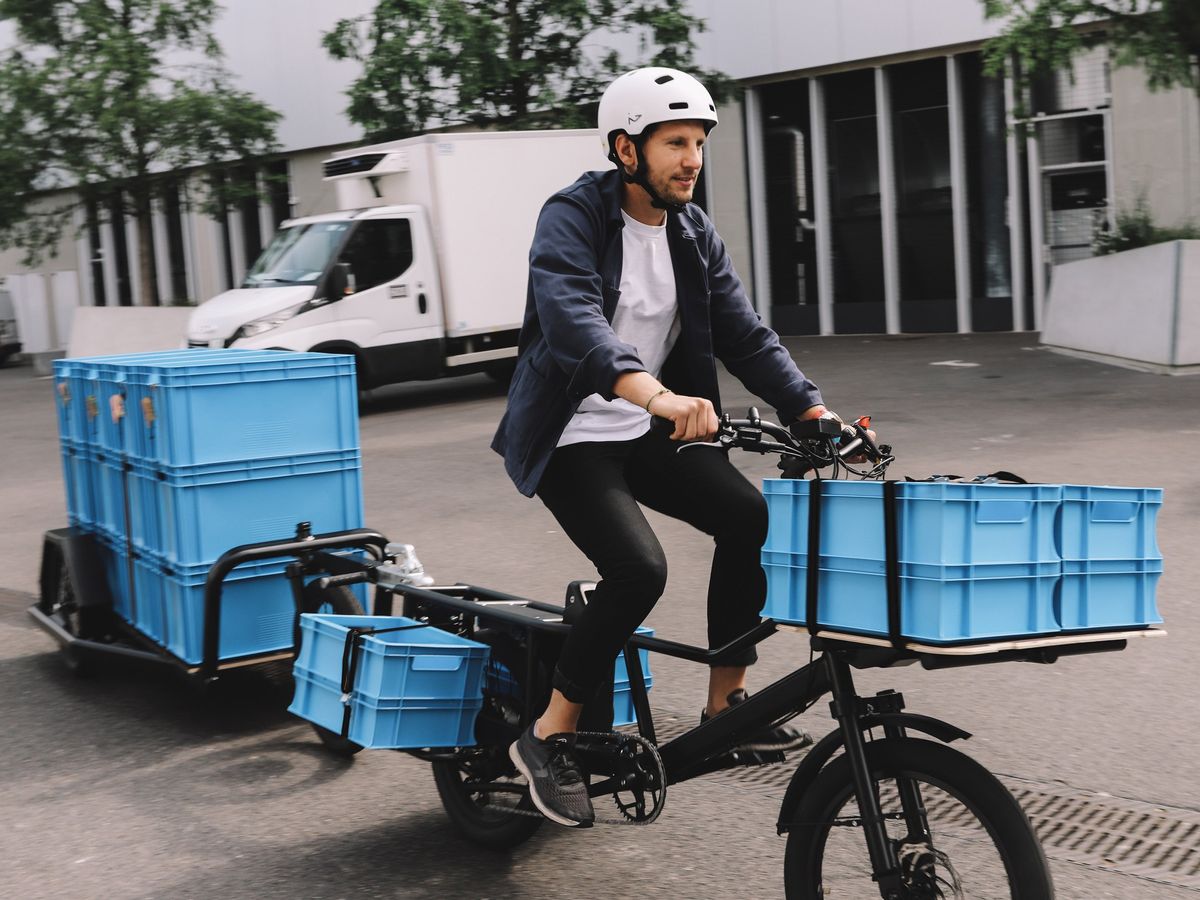E-bikes have, over the course of the COVID-19 pandemic, become staples for businesses and independent gig workers who earn money transporting small, lightweight items like food deliveries. If the item can fit in a basket mounted on the handlebars or behind the rider’s seat, it can be dropped off just about anywhere.
But as the demand for home delivery of food and endless other items has taken off, two French engineers with experience in bicycle design recognized an opening. What, they wondered, about wedging open an untapped portion of the transportation market for a type of vehicle that is smaller and more eco-friendly than delivery vans and trucks? Then, what if, unlike a conventional bicycle or e-bike, this cargo carrier could also deliver loads of just about any size right to online shoppers’ doors?
Alex Jacquelin and Thomas Borie, who founded French startup Pelican Bicycle in 2021, came up with the idea to produce an e-bike with a dedicated cargo platform and the ability to link up with as many as two self-powered cargo trailers. The electric motors on the resulting “Pelican e-bike train“ deliver 250 watts of propulsive power, yielding 111 newton-meters of torque. That’s enough, says Pelican, for the trackless train to haul loads that take up 3,000 liters of space and weigh up to 500 kilograms.
The goal is that if you can ride a bike, you can ride the train, with the same handling and feeling and with the same effort on the pedals and brakes as well.”
–Thomas Borie, Pelican Bicycle
The bike and each trailer have a 650 watt-hour lithium-ion battery using nickel, cobalt, and manganese chemistry. Pelican says this is enough energy to propel the 35 kg bike, its 45 kg trailer, and the load the train is hauling for 30–40 kilometers on a single charge.

The bike and the trailers keep tabs on each other via a proprietary communications system that coordinates their throttle and braking action. This technology, says Borie, “synchronizes the modules so that the trailers can follow the bike at the same exact speed as the bike, never pushing or pulling it.” A cable link lets the modules share power and braking information gathered from torque sensors on the pedals and brakes, as well as from wheel speed sensors. “The goal,” says Borie, “is that if you can ride a bike, you can ride the train, with the same handling and feeling and with the same effort on the pedals and brakes as well.”
Speaking of brakes, the train doesn’t want for stopping power. The bike has four-piston cargo bike brakes on the front and back wheels. The cargo trailers feature regenerative braking (in addition to mechanical brakes) so some of the kinetic energy moving the train forward is converted back to electric charge and stored in the batteries as the vehicle slows down. What’s more, says Borie, is that the inter-module communications system has a safety mode that brakes the whole train when any of the modules is disconnected from it.
Without any trailers attached, the Pelican e-bike can reach speeds of up to 25 kilometers per hour (which is the maximum legal speed for such vehicles in the EU). When one trailer is attached, the speed is electronically limited to 21 km/h; and to 18 km/h with two trailers connected. According to the pricing information available on Pelican’s website, a Pelican setup can be rented for as little as 15 euros per day—with purchasing options starting at 4,500 euros.
Pelican’s founders say they have considered the possibility of someday creating a version of the e-bike train that serves as a people mover. But because it is not yet clear what future EU regulations will allow in terms of number of people such a vehicle could carry, on what type of bike, and other important variables, “for now we mostly focus on the B2B cargo industry,” says Borie.
Willie Jones is an associate editor at IEEE Spectrum. In addition to editing and planning daily coverage, he manages several of Spectrum's newsletters and contributes regularly to the monthly Big Picture section that appears in the print edition.



